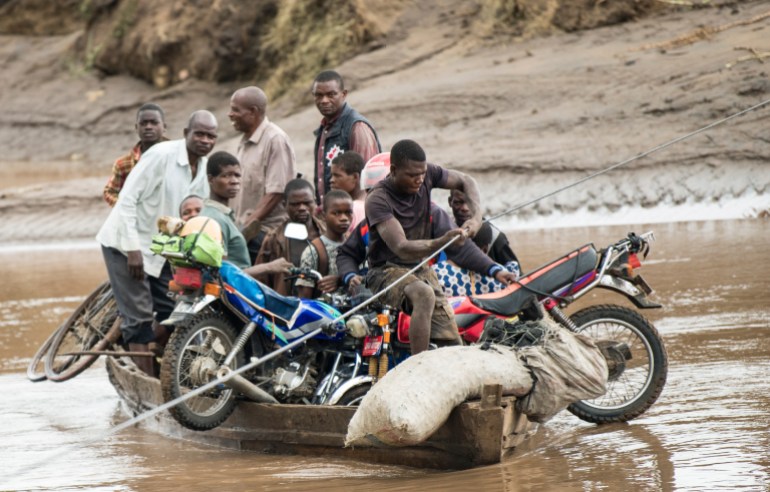Blantyre, Malawi – Joe Kambale has been stitching men’s suits from his living room in Blantyre, Malawi’s commercial hub, for the last eight years. Sometimes he makes about 200,000 kwacha ($173) a week, decent wages in a country where half of the population lives on $1 daily or less, according to data from Malawi’s National Statistical Office.
He was often so swamped with work that he was sometimes unable to take on new customers for up to a month. But in the last two weeks, the 35-year-old tailor’s pair of sewing machines have been idle because demand is dwindling.
And now he is finding it hard to cater to the needs of his wife and one-year-old son.
“The high cost of living has driven clients away,” he said, with a look of despair in his eyes. A month ago, two of his most loyal customers suspended orders indefinitely, telling him that they are now prioritising spending their earnings on basic needs.
The rising cost of materials is also eating into the small profit margins for Kambale’s business, which is run on a shoestring budget.
“Most of the materials that we use in tailoring are imported. When I go to the market to buy them, I find prices have increased because of dwindling imports. Almost every day prices are changing,” said Kambale. “Raising the prices of my suits is difficult because I might lose customers. I’m making losses.”
Life in this southern African country of 20 million people has become harder in recent years.
Since 2021, the country has been experiencing acute foreign currency shortages, a consequence of reduced exports, experts say. This has led to a scarcity of essential goods such as food, medicine, fertiliser and fuel. In June, spokesperson for the Reserve Bank of Malawi, Ralph Tseka, told local media that the foreign exchange reserves were “nearly empty”.
Analysts like Betchani Tchereni, associate professor of economics and dean at the Malawi University of Business and Applied Sciences say Malawi is still feeling the effects of COVID-19 and the war in Ukraine on the global supply chain. Since the conflict began in February 2022, the price of bread has increased by at least 50 percent.
“The pandemic destabilised tobacco export and when the war started, the prices of chemical fertiliser skyrocketed, meaning that we couldn’t afford the quantities that we needed any more,” he said. “This also came at a time global inflation in general went up meaning that we couldn’t afford many imports. It further drained our forex and led to inflation.”
Beyond that, there is also a ripple effect from the impact of Cyclone Freddy which displaced nearly 90,000 people this March in Blantyre and parts of southern Malawi.

‘The worst is yet to come’
To stabilise dwindling forex reserves, Malawi’s central bank devalued the kwacha by 25 percent last May. As of this October, the currency had further weakened by 4.87 percent. Due to rocketing year-on-year inflation – 28.6 percent as of September – everything from food to electricity has gone above the reach of most people.
For instance, Malawi’s main staple, maize, has increased by 15 percent, according to the Famine Early Warning Systems Network. As of June, a family of six in an urban setting needed 377,892 kwacha ($326.53) per month to survive, up from 257,028 kwacha ($222.09) during a similar period last year, according to the Centre for Social Concern-CfCS, a local research-based non-profit.
“The worst is yet to come,” John Kapito, executive director of the Consumers Association of Malawi, told Al Jazeera. “For a long time, the country has failed to balance its imports against exports and has relied heavily on donors for its forex reserves. Our government is in no position where it can cushion anyone. Its revenue collection has drastically gone down as a result of market inactivity and [it] is currently struggling to pay its oversize civil service.”
Agriculture predominantly powers Malawi’s economy, contributing approximately a third of its gross domestic product. Yet, even annual revenue from tobacco, the country’s major foreign exchange earner with $283m in sales already this year, is insufficient to cover the country’s imports bill. According to the Reserve Bank of Malawi, the country requires $3bn annually to meet import requirements but only earns about $1bn.
“For a predominantly exporting country like ours we want the exchange rate to be as strong as possible because that makes the goods affordable but that works if forex is available and obviously that’s not the case with us,” said Tchereni. “It means that every time we are devaluing the kwacha against the US dollar and other currencies, commodities become expensive, disproportionately affecting the ultra-poor people, as is the current situation.”
With the country’s economy in bad shape, the need to move towards greater economic stability has become increasingly urgent. Tchereni believes the private sector is the engine to drive that development. “It is the role of the private sector to generate forex and engage in import substitution. Regrettably, as a country, we’ve fallen short in this area,” he told Al Jazeera.

‘A very thin budget’
Gift Lukas, a taxi driver in Blantyre, has been skipping lunch in recent weeks so his wife can use that money to feed their two children at home.
“My lunch money is 2,000 kwacha ($1.73) which is even very little and not enough for them at home,” said the 30-year-old who makes about 60,000 kwacha ($51) a week on good days. “Not so long ago I could manage that [weekly] money but now that same amount is almost close to nothing,” he said. “I’m running on a very thin budget. That money has to cover rent, school fees for my children and food. As a result, I end up getting into unnecessary debts.”
The forex shortages have also led to recurring fuel shortages that have triggered nationwide frustration in Malawi. Drivers like Lukas have been forced to park their vehicles for days at a time, earning nothing in that period.
Faced with no other option, he turned to purchasing fuel on the black market, where a litre of petrol goes for as much as four times the official rate of 1,750 kwacha ($1.51). “I made big losses because I could not raise fares for my customers, if I did, it could have kept me out of business,” he said. “Problems won’t just go away in this country.”
Tchereni says Malawi must industrialise, with a focus on mining, if the country is to become a self-sustaining economy. “We have valuable minerals, and we need to explore ways to export them while adding value at the same time. This is achievable if the private sector invested in mining,” he said.
The Kambales have since changed their consumption patterns, swapping the more expensive bread for the cheaper sweet potatoes for breakfast. The tailor’s long-harboured ambitions of moving his business into a downtown shop are now on hold and he is having to ask friends for help with money.
“I totally understand why people seek better opportunities abroad,” he told Al Jazeera. “In all honesty, I have been thinking about this for a while now.”
https://news.google.com/rss/articles/CBMidmh0dHBzOi8vd3d3LmFsamF6ZWVyYS5jb20vZmVhdHVyZXMvMjAyMy8xMC8xOC92ZXJ5LXRoaW4tYnVkZ2V0LWZvcmV4LXNob3J0YWdlLXRyaWdnZXJzLWNvc3Qtb2YtbGl2aW5nLWNyaXNpcy1pbi1tYWxhd2nSAQA?oc=5
2023-10-18 10:51:08Z
CBMidmh0dHBzOi8vd3d3LmFsamF6ZWVyYS5jb20vZmVhdHVyZXMvMjAyMy8xMC8xOC92ZXJ5LXRoaW4tYnVkZ2V0LWZvcmV4LXNob3J0YWdlLXRyaWdnZXJzLWNvc3Qtb2YtbGl2aW5nLWNyaXNpcy1pbi1tYWxhd2nSAQA
Bagikan Berita Ini














0 Response to "'Very thin budget': Forex shortage triggers cost-of-living crisis in Malawi - Al Jazeera English"
Post a Comment